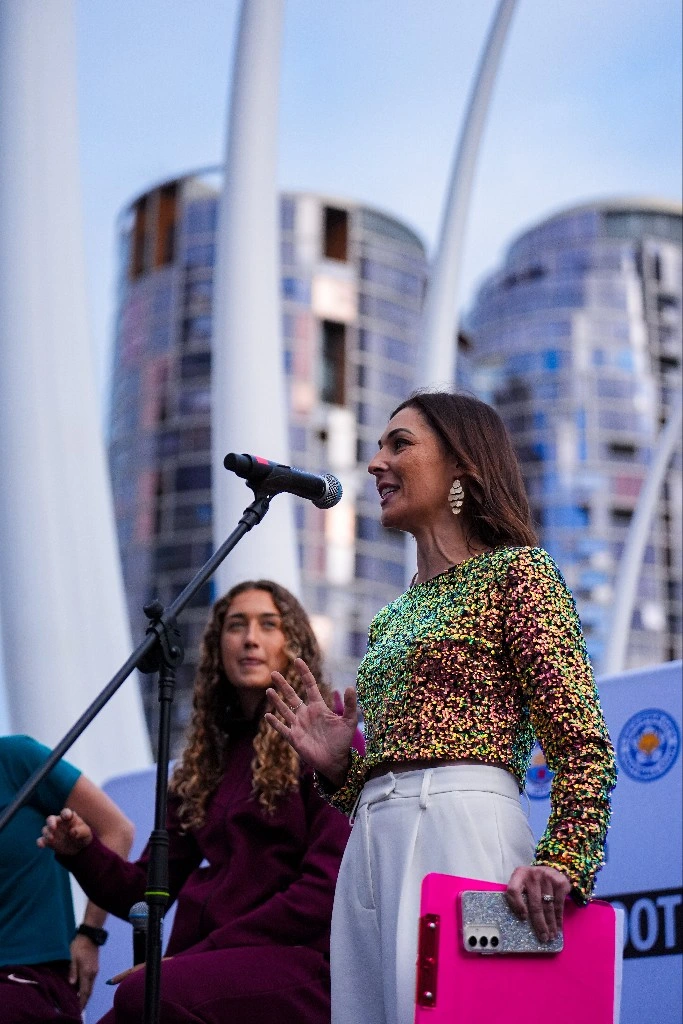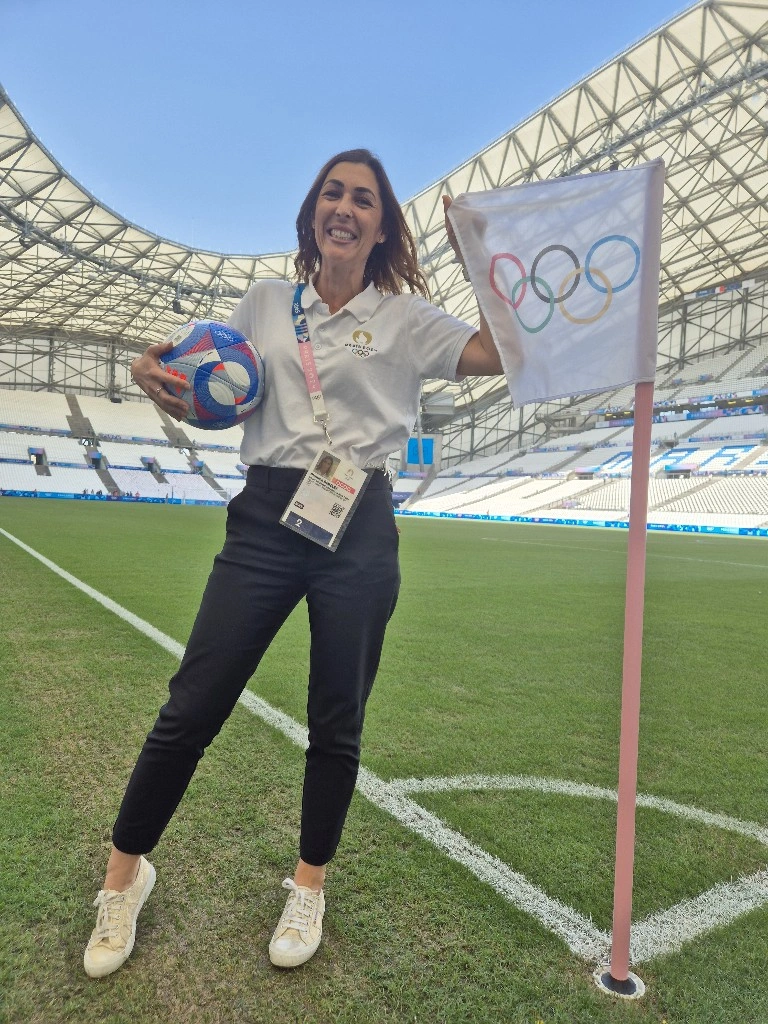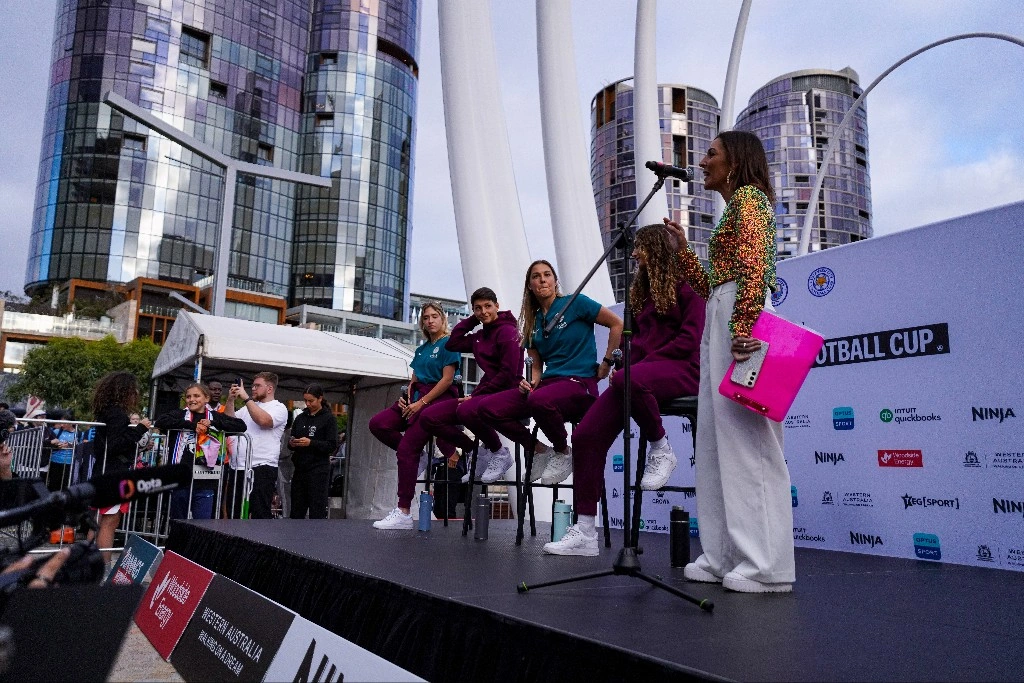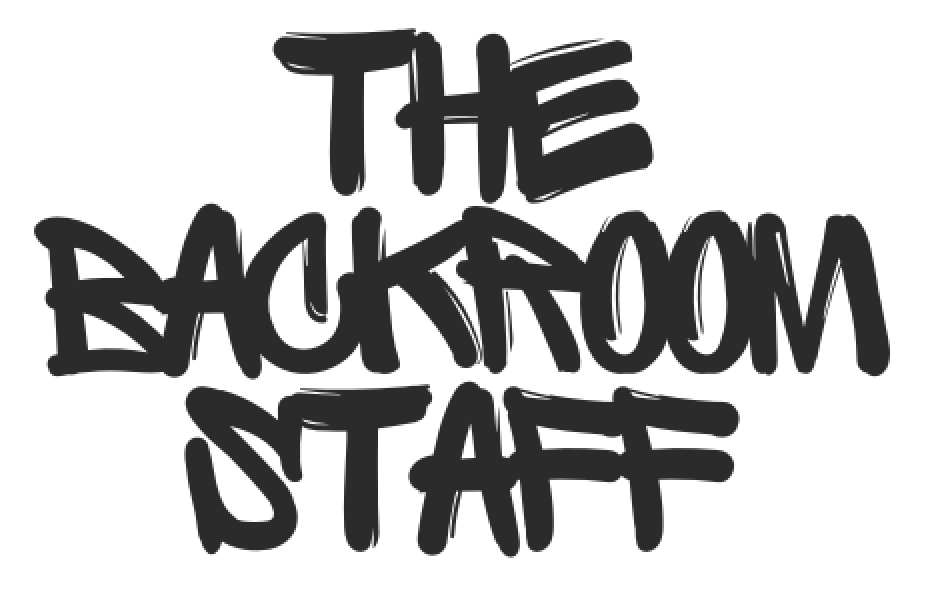I love stories of people who switched careers - it’s especially encouraging to see someone who’s done it so successfully.
Monica Beazley's career journey is an amazing example of how far passion and perseverance can take you in the world of football business. Without a formal business background, she leveraged her experience in public relations, TV, and local government to carve a unique path in the sports industry.
Starting with a part-time role organizing events for Football West (the Western Australia FA), Monica took every opportunity that came her way, bet on herself and just 6 years later, was hired as the commercial GM at Perth Glory FC, Western Australia's only professional football club.
Monica’s charisma and history of ‘simply’ setting big goals and achieving them is really inspiring. It’s no wonder she also runs a coaching company where she helps people, especially women, build leadership skills and make a positive impact!
I really enjoyed this interview and hope you do too.
The interview has been condensed and lightly edited for grammar and clarity.

[ Can you share a little about your background and your early involvement with football? ]
I’ve been working in football for the last decade, but have been passionate about the game as long as I can remember. I grew up in a family with 3 sisters - I was the youngest of 4 girls - and my dad, I think, was probably waiting for a boy to come along - but I did! I used to just tag along to whatever football related thing he was going to, he was playing, coaching and running football clinics. And I was like, man, I love this.
I started playing in a boys team when I was 10 years old because there weren't really any girls teams going around, and if they were, I don't think they were any good. I got teased quite a bit, and that sucked, but that was just a mentality in those days (~30 years ago). It just wasn’t a thing, girls weren’t playing football. I'm lucky enough that I stuck with it and it ended up becoming a career path for me.
[ When did you start working in football? ]
I was working at a television station here in Perth, Western Australia, where I grew up, and I met the CEO of Football West, which is the governing body of football in Western Australia.
At this point I didn't have aspirations of working in sport, I just loved being around it. I had a 3 days/week job in local government and he offered me a job for 2 days/week as event manager. That was a really incredible and varied role. I would organize big events around the end of the season, cup finals or VIP functions. I wasn't there long before they gave me another job! And this job was actually what led me to what I'm doing now. I became team manager of the Perth Glory Women’s team - at the time, the women’s side was managed by Football West. Later, when I worked for Perth Glory, they had taken on the women’s side under the same corporate umbrella.
Anyway, they told me it’s part-time, it’s easy. If anyone knows any role in sport, nothing's easy, and nothing is like what it says on the label! But it was the most incredible opportunity. I was responsible for organizing the team’s food, their logistics for away games - so flights, buses, accommodation - visas, transfers, everything. I got to travel with the team around Australia and to all their games and made sure the girls were looked after.
We can't quite predict the outcomes of our lives and for me, I didn’t realize what was available in a career in sport. I kind of stumbled my way into it!
[ How was the switch to Perth Glory and a more full-time role? ]
After 6 years, I left Football West to go and have a baby. Some people at Perth Glory knew I was doing a good job there and needed someone to help them with events. I was just going to go back to my government job 3 days/week and offered a 1 day/week job doing event management. I helped them and coordinated and ran what was quite a considerable ball with about 500 people with distinguished guests, key stakeholders, and different sponsors.
Then a new, highly established CEO came to the club - Tony Pignata - he’d been at Wellington Phoenix and Sydney FC for years. He brought a commercial manager with him from Sydney FC who knew he needed someone highly organized and personable who could run events for corporates and deliver on corporate partnership type responsibilities. We had one meeting and he asked me to work with him full time in corporate partnerships - I wasn’t looking for a full time role because I wanted to have another child but after a big negotiation for paid maternity leave, I ended up agreeing.
I left my local government role as well to work at Perth Glory full time. It ended up being a really good decision. I was working for the GM of commercial - he’s now the CEO of Adelaide 36ers (National Basketball League), he’s unbelievable. The training I got, even though I’ve never studied business or done an MBA - I got one on the job! It changed my career trajectory.
That was really a gateway into the commercial world that I knew I wanted to get into. Then my boss left - I thought, ‘Oh, my goodness, this is my opportunity to be GM’. The CEO invited me into his office. I had butterflies and nerves but I was excited, I thought, this is the day that I get the biggest promotion of my life. And he said, ‘We can't give you the job’ - my heart sank - I asked why not and he said because you’re a woman (!) and the owner doesn’t want a woman in this job.
This became a real ‘sliding doors’ moment in my life. There were several moments working in football and sport where being a woman wasn’t an advantage but a disadvantage. People treated me differently, some of the corporate partners didn't want to talk to me and would wait until my boss was available, and that really hurt, because I’m competent!
Instead of getting angry, I asked for a chance. I said please give me 3 months and let me show you what I can do. We shook hands and I went to work. Within 3 months I had done enough. I had brought on new partners and re-signed existing ones with larger investments. They gave me the job and it was the start of something very special.
[ Wow - what did you do in this ‘trial’ period? ]
The first 3 months were stressful as you can imagine, this was my career on the line. I thought about work every moment of the day. It kept me awake at night because I knew I could do it, but I didn't actually know ‘how’. I wasn't given a roadmap on how to sell sponsorship, so I had to think about the lessons that my boss had given me.
I had a couple of leads ready to go that I didn't want to action on until I knew I had the job because I didn't want to set this sponsor up to just hand over to another person who got my job!
So there were a couple of things that I had in the fire, I had a pipeline of leads and just kept following up and making calls, having coffee with people, asking for referrals. It wasn’t glamorous but with a bit of grit, hard work and just putting my limiting beliefs to the side, I did it. There’s no motivation for me like being told I can’t do something.
"It wasn’t glamorous but with a bit of grit, hard work and just putting my limiting beliefs to the side, I did it. There’s no motivation for me like being told I can’t do something"
[ What is the ‘pitch’ to a sponsor like? - why should they sponsor the club? ]
This was in the lead up to the Women’s World Cup so I was leveraging that increased exposure on our brand. We’re the only A-League club in WA and Perth was receiving 5 matches at the World Cup. I was able to talk about this global event coming to our country, coming to our state and I was right - there was an incredible increase in exposure, and there was more of a focus on the sport from a government level. So the sponsors that actually came on board in the lead up to the FIFA Women’s World Cup really were able to leverage off the momentum that event created.
So while that was one of the strategies that I was using, sponsorships are really a tailored game. Depending on who you're talking to, it depends on what you're going to offer them!
If I'm going to a health food brand, I might connect them with the possibility to sponsor one of our marquee players and organizing promotional campaigns with their products. If it’s a car rental company, they are probably less into people being seen in their car but want things like signs or writing on the car - like ‘partnership with Perth Glory’ or something so they have that visual representation with a professional brand.
For me, it was about doing a bit of research, knowing who I was pitching to and what their pain points were. How can I use this sponsorship to solve this problem for them - do they need more eyeballs on their social media or do they need more people walking into their store? Etc
[ Are there commercial benefits or drawbacks of being so geographically isolated? Can you basically monopolize the companies (re: sponsors/partners) in Western Australia? ]
Where I’m from football (the round ball game) is not the number one sport. The top sport is AFL - Australian Football League, so most of the big brands and the big mining companies put money into that sport. So although we were the only A-League team here, we still really battled to get a piece of the commercial pie because organizations didn't want to invest in football.
[ How do you balance the needs and wants of the fans with financial and commercial goals for the club? ]
I think it's so beneficial to have experience in both a federation and a professional club, you can understand how a not-for-profit works and also how a commercial organization works, especially through the lens of sport.
There was this balance with business ethics, making the club profitable and ensuring a good fan experience. It was a challenging balance because I cared about things being done in a very equitable and ethical way. I had lots of arguments with some of the senior leaders at my organization because they didn't agree or only saw the business costs of a decision. We should also consider potential gains in brand equity with our fans - and the value of that.
I’m trained in public relations so I think about things from a commercial perspective but I’ll always think about it from a reputational standpoint too. Bad press is one thing but more than that it’s important to look after people who have stuck by you for years and have been through the highs and the lows with us. You just can't sting them (to make a little money). It's not right.
[ Australian football operates in a ‘closed system’ (no promotion/relegation from the top division) - do you think this helps or hurts football in Australia from a playing but also a financial perspective? ]
My friends and I have discussions about this and I'm in two minds about it. I do think it brings a level of urgency to teams to ensure that they continually bring quality. But I don't know if we have the depth of quality in Australia to sustain multiple leagues at that top level.
There’s such a big gap in quality from the A-League to the National Premier League (‘2nd division’ - divided regionally). An A-League team dropping into the NPL would be devastating and I think an NPL team in the A-League wouldn’t be a beneficial experience for them either.
[ What are the best parts about working in football? ]
I feel like it's an addictive job because the highs are really high. I was fortunate enough to be involved in the women's team when we had 5 Matildas - national team players - playing in our Perth team and they won the Premiership in 2014 which was really cool. In 2019, the men won their first Premiership and that was an incredible year as Perth also played in the Asian Champions League for the first time.
So to answer your question, it’s the unpredictability. It's not knowing what's going to come, and experiencing the wildest of rides.
And I can say that with good experience working in a job that didn't have that because I've worked in local government!
(in football) The people have a certain type of personality that I really enjoy working with. They're passionate, intense, they work hard - maybe even a little bit erratic - they don’t look at the time and say ‘it’s 5 o’clock, everyone needs to go home’. You're there because you love it - almost no one is in the industry for money.
A lot of people stay in government roles because it's safe, you get good benefits, a pay rise every year, and they give you a day off every 2 weeks just for nothing. If you’re interested in that life, it suits you beautifully, but it often attracts the type of personality that is not my vibe.
In football, you feel part of something. If you have a crap year or you end the season on top, there’s closure and a feeling of accomplishment that you’re part of something and I think that’s really special and hard to get in an industry outside of sport.
"In football, you feel part of something"
[ You were recently an announcer at the Olympics in France - what was this like? ]
I had a goal to be an announcer at the Paris Olympic Games. I was an announcer for one game at the Women’s World Cup - Denmark vs China in Perth and it was incredible. I was like, “inject this into my veins. This is what I’m supposed to be doing on this planet!”
I thought maybe I'd get another call up but I didn't. So I started looking for the next major event that I can be a part of - I’m going to work towards getting that. I looked at the calendar, and well, the Paris Olympics. How hard can it be to get a job at the Olympics?
I can assure you it is very hard to get a job at the Olympics! It took me 10 months to find the right person to apply to. I was very fortunate to get the opportunity but I do believe that I was the right choice, because I think people that are willing and determined to not settle for anything less than their goal are a force to be reckoned with.
I was placed at the stadium (Stade Vélodrome in Marseille) where Australia was playing most of their game and I was also at the stadium where France played the USA in the opening game (men’s) - a 67,000 seat sellout - it was unbelievable, just goosebumps. It was my ‘destiny’ in a way.
My next goal is to announce at every major football tournament in the world. Next year I'm going to go to Switzerland for the women’s Euros.

[ It’s just over a year since the extremely successful and record-breaking Women’s World Cup in Australia - has this momentum and excitement for women’s football continued? ]
This is the start of something amazing, football in this country has changed forever.
The seasons are changing - just last weekend in Perth we had the inaugural Perth International Football Cup - we had West Ham United, Leicester City, Manchester City and Paris Saint-Germain women’s teams here for a round-robin tournament. I was fortunate enough to be the MC for a couple of events including a fan Festival at Elizabeth Key - kind of our premier spot in the middle of the city overlooking the Swan River - and so many fans came out in the rain, it just made my heart burst. It showed that the Women's World Cup has left such a legacy in the hearts of these young women and girls who perhaps before the World Cup didn't know any of these players or any of these teams. Now Mary Fowler rolls up to Elizabeth Key and everybody shows up!
There’s a lot more investment including from the government, specifically in women and girls to get more people playing the sport. In 2026 we’ve got the next big tournament, the Asian Cup coming to Perth, Sydney and Queensland. It’s on.

"This is the start of something amazing, football in this country has changed forever"
